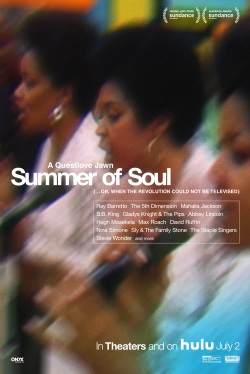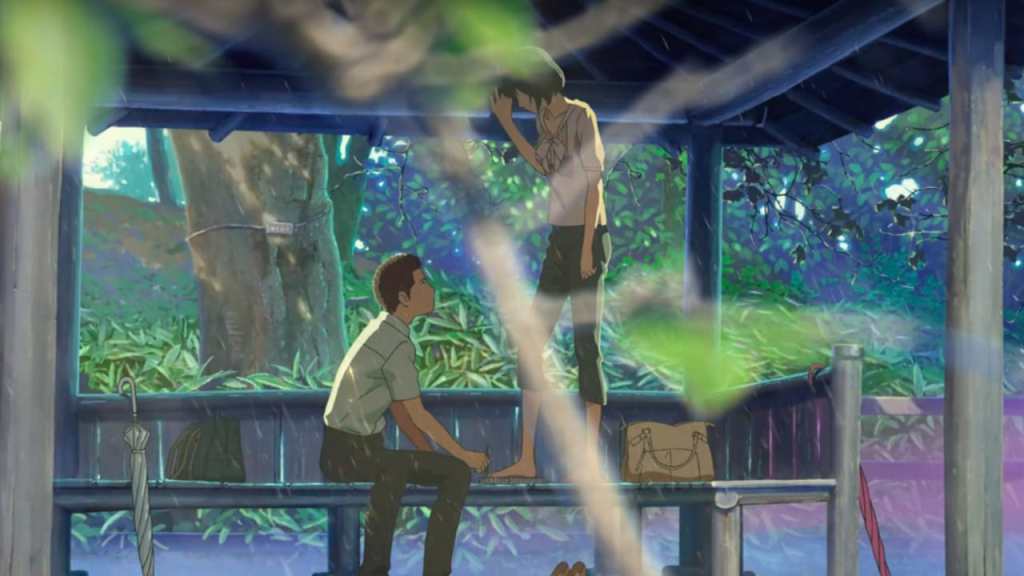 Or, to give its full title (that would play havoc with this website’s layout), Summer of Soul (or, When the Revolution Could Not Be Televised). In 1969, New York’s Harlem played host to a series of six weekly concerts presented free to the community in a local park. Despite being a hugely popular event at the time, and having the entire six days’ worth of performances recorded for posterity, the Harlem Cultural Festival was by-and-large forgotten by mainstream (read “white”) culture and overshadowed by the Woodstock Festival held that same year. Other than a series of one-hour compilations broadcast in New York later in 1969, the footage has remained archived and unseen for more than 50 years. The Festival now forms the spine of a new feature documentary – the directorial debut of Ahmir “Questlove” Thompson, drummer and co-lead of hip-hop band the Roots.
Or, to give its full title (that would play havoc with this website’s layout), Summer of Soul (or, When the Revolution Could Not Be Televised). In 1969, New York’s Harlem played host to a series of six weekly concerts presented free to the community in a local park. Despite being a hugely popular event at the time, and having the entire six days’ worth of performances recorded for posterity, the Harlem Cultural Festival was by-and-large forgotten by mainstream (read “white”) culture and overshadowed by the Woodstock Festival held that same year. Other than a series of one-hour compilations broadcast in New York later in 1969, the footage has remained archived and unseen for more than 50 years. The Festival now forms the spine of a new feature documentary – the directorial debut of Ahmir “Questlove” Thompson, drummer and co-lead of hip-hop band the Roots.
Given the preponderance of concert footage in Summer of Soul, it would be easy to mistake it for a simple concert documentary. Thompson’s ambition are far loftier. 1969 was a critical period for African-American culture, society, and identity, with a civil rights struggle in full swing and both Malcolm X and Dr Martin Luther King recently assassinated. The Harlem Cultural Festival is a box office draw, but it acts less as content in its own right and more an excuse to explore black culture at a critical phase of its struggle against racism and a white hegemony. Through interviews with musicians, politicians, academics, and other popular identities, Thompson aims to explore the underlying issues upon which the festival occurred – issues that broadly speaking still affect black lives today.
He is extraordinarily successful in this goal. Summer of Soul is smart, engaging, and thought-provoking. It highlights issues and events with intelligence and clarity: the evolution of black Christianity and its influence on music, the Vietnam War, drug epidemics, and other social topics. It contextualises the festival within the civil right movement and America in the late 1960s. Through effective editing and writing, it also manages to be enormously emotional. This is a film about things that matter.
And, of course, it is peppered with phenomenal live concert footage. Stevie Wonder features, as does Nina Simone, the 5th Dimension, B.B. King, Gladys Knight and the Pips, Mavis Staples, Mahalia Jackson, and Sly and the Family Stone. It is a goldmine of footage, capturing some artists in their prime, others in their twilight years, and some right at the beginning of their careers. This footage’s value to music history is incalculable, and one imagines some future home release of the documentary is going to come with one hell of a set of special features.
It is also abundantly clear why the Harlem Cultural Festival slipped so easily into obscurity. It does not fit the overwhelming white-dominated narrative of African-American history. White history chose to remember the riots, the assassinations, the violent resistances, and the drug epidemics. A large-scale peaceful, progressive community festival simply fails to slot in place. It complicates popular history with its inclusion. Summer of Soul is not simply an excellent documentary; Thompson has undertaken a significant public service.
Summer of Soul opens in available Australian cinemas on 2 September 2021.





Leave a comment